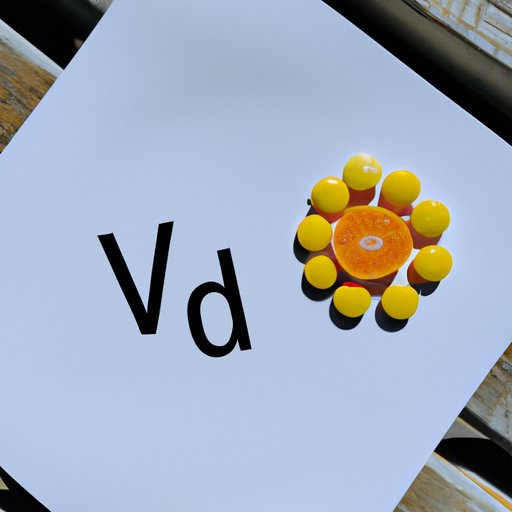Introduction
Vitamins are essential for maintaining good health and a healthy body. They can be found in the food we eat and can also be taken as supplements. From vitamin A to vitamin K, each vitamin plays a vital role in maintaining the proper functioning of the body. In this article, we will explore one of the most important vitamins for the body – Vitamin D.
Top 7 Essential Vitamins for a Healthy Body: Which One Is the Most Important?
Before we delve into why Vitamin D is the most important vitamin for the body, let’s discuss the top seven essential vitamins that the body needs. These include Vitamin D, Vitamin C, Calcium, Vitamin B12, Vitamin E, Vitamin A, and Vitamin K. While all of these vitamins are essential, Vitamin D stands out as one of the most important.

Why Vitamin D Is the Most Important Vitamin for Your Body
Vitamin D is a crucial nutrient that plays many important roles in the body. Its main function is to help the body absorb calcium, which is essential for building and maintaining strong bones. However, Vitamin D does much more than that. It also helps regulate the immune system, supports healthy brain function, and strengthens the muscles.
When the body gets enough Vitamin D, it has various positive effects on overall health. Vitamin D promotes healthy bones, reduces the risk of diabetes, heart disease, and multiple sclerosis. Also, several studies have linked Vitamin D to lower mortality rates and reduced risk of cancer.
Examples of Health Issues Related to Vitamin D Deficiency
A Vitamin D deficiency can have severe consequences on the body. Vitamin D deficiency can lead to several health conditions, including:
- Rickets in children – a condition that causes weak bones and skeletal deformities
- Osteoporosis – a condition that causes bones to become weak, brittle, and more prone to fracture
- Increase in asthma among the population
- Increase in the risk of type 2 diabetes, high blood pressure, and heart disease.
The Connection Between Vitamin C and a Healthy Body: What You Need to Know
Vitamin C is a popular vitamin known for its immune-boosting properties. Vitamin C not only helps maintain a healthy immune system but also assists in the absorption of iron. It also plays a crucial role in maintaining a healthy complexion and wound healing.
Examples of Health Issues Related to Vitamin C Deficiency
A Vitamin C deficiency can lead to several health conditions, including:
- Scurvy – a disease that causes weakness, anemia, and skin hemorrhages
- Slow wound healing and the development of skin ulcers
- Low iron absorption and anemia
- A decrease in the immune system

Building Strong Bones: Understanding the Importance of Calcium
Calcium is a mineral that helps build and maintain strong bones and teeth. It also plays a crucial role in the proper functioning of muscles and nerves.
Examples of Health Issues Related to Calcium Deficiency
A Calcium deficiency can lead to several health conditions, including:
- Risk of weakened bones and osteoporosis
- Increase the risk of fractures or broken bones, especially among the elderly
- Weak and brittle nails, dry skin, and irritation

Vitamin B12: The Vital Nutrient Your Body Needs for Energy and More
Vitamin B12 is a crucial nutrient responsible for the proper functioning of the brain and nervous system. It plays an essential role in maintaining healthy blood cells and energy levels.
Examples of Health Issues Related to Vitamin B12 Deficiency
A Vitamin B12 deficiency can lead to several health conditions, including:
- Anemia – a condition that causes weakness, fatigue, and shortness of breath
- Decreased brain function and memory loss
- Nerve damage and tingling sensations in the hands and feet
The Power of Vitamin E: How This Essential Nutrient Supports a Strong Body
Vitamin E is an antioxidant that helps protect the body’s cells from damage caused by free radicals. It also plays a crucial role in maintaining healthy skin, eyes, and immune system.
Examples of Health Issues Related to Vitamin E Deficiency
A Vitamin E deficiency can lead to several health conditions, including:
- Increased risk of infections and illness among the elderly
- Nerve damage and muscle weakness
- Vision impairments and retinal damage
Why You Need Vitamin A for Optimal Health: The Benefits and Best Sources
Vitamin A is a crucial vitamin that helps maintain healthy vision, skin, and mucous membranes. It also plays an essential role in the growth and development of bones, teeth, and the immune system.
Examples of Health Issues Related to Vitamin A Deficiency
A Vitamin A deficiency can lead to several health conditions, including:
- Vision impairments, night blindness, and dry eyes
- Increased susceptibility to infections, particularly respiratory infections
- Poor growth and development, particularly concerning bones and teeth
Conclusion
To sum it up, all vitamins are essential for optimal body functioning. However, Vitamin D stands out as the most important vitamin for the body, due to its various benefits on overall health. Insufficient Vitamin D could lead to many health conditions like osteoporosis, high blood pressure, and heart disease. It’s also essential to note that a deficiency in any of the essential vitamins discussed in this article could lead to health issues. Therefore, it is essential to ensure we get enough of the essential vitamins through our diets or supplements. As such, we should aim for a well-balanced diet that contains a variety of foods to achieve optimal health.


